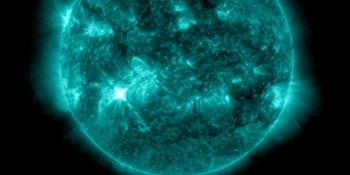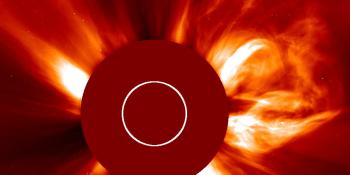Visualizzazione archivio di domenica, 17 marzo AM
Rapporto attività solare
Ogni brillamento solare menzionato nel rapporto ha un fattore di scala, applicato dal Centro di Predizione Meteorologica Spaziale (SWPC). A causa del fattore di scala del SWPC, i brillamenti solari sono segnalati come ridotti del 42%, rispetto ai dati di qualità scientifica. Il fattore di scala è stato rimosso dai nostri dati archiviati sui brillamenti solari, per riflettere le unità fisiche reali.
Rapporto dell'Attività Geofisica Solare 2002 Mar 17 2200 UTCPreparati dal SWPC della NOAA© ed elaborati da SpaceWeatherLive.com
Rapporto Congiunto USAF/NOAA dell'Attività Solare e Geofisica
SDF Numero 076 Emesso alle 2200Z il Mar 17 2002IA. Analisi delle Regioni Solari Attive e Attività dalle 2100Z-16 alle 2100Z-17 Solar activity was moderate during the past 24 hours.
Region 9871 (S18E20) produced today's biggest event, an impulsive
M4/Sf at 1931 UTC. The region appears to be growing slowly. An
additional M-class event occurred: an M1 at 1019 UTC for which there
was no optical report. Region 9866 (S09W33) is decaying gradually,
but is still the largest region on the disk. Retrospective analysis
of the CME that occurred around 15/2310 UTC shows a full halo event
with an estimated plane-of-sky speed somewhere in the 750-850 km/s
range. New Region 9873 (S17W09) emerged near the middle of the solar
disk during the past 24 hours.
IB. Previsione dell'Attività Solare
Solar activity is expected to be
moderate during the next three days, with Regions 9866 and 9871
being the most likely sources.
IIA. Sommario dell'Attività Geofisica dalle 2100Z-16 alle 2100Z-17
The geomagnetic field was quiet during the past 24 hours. The greater
than 10 MeV protons began to rise at the very end of the UT day
yesterday and crossed event threshold at 17/0820 UTC. The fluxes
reached a maximum of 13 PFU at 17/0850 UTC. The fluxes dropped below
threshold at 17/1230 UTC, but have been fluctuating and have been on
the increase since around 1500 UTC. It seems probable that the
current slow climb is related to the approach of an interplanetary
shock.
IIB. Previsione dell'Attività Geofisica
The geomagnetic field is
expected to reach active to minor storm levels tomorrow in response
to the halo CME event of 15/2310 UTC. A decrease to active is
expected on the second day and a further decline to unsettled is
expected by the third day. The current trend of the 10 MeV protons
and the likely arrival of a shock in the next 12 hours all suggest
that the proton fluxes should once again cross threshold.
III. Probabilità dell'Evento dalle Mar del 18 alle Mar del 20
| Classe M | 50% | 50% | 50% |
| Classe X | 05% | 05% | 05% |
| Protone | 50% | 05% | 05% |
| PCAF | yellow | ||
IV. Flusso di 10.7 cm di Penticton
Osservato 17 Mar 184 Previsto 18 Mar-20 Mar 190/195/190 Media di 90 Giorni 17 Mar 215
V. Indici Geomagnetici A
Osservato Afr/Ap 16 Mar 005/005 Stimato Afr/Ap 17 Mar 005/005 Previsto Afr/Ap 18 Mar-20 Mar 030/030-020/020-010/010
VI. Probabilità dell'Attività Geomagnetica dal 18 Mar al 20 Mar
| A. Latitudini Medie | |||
|---|---|---|---|
| Attivo | 20% | 25% | 25% |
| Tempesta minore | 25% | 20% | 15% |
| Tempesta maggiore-grave | 20% | 15% | 05% |
| B. Latitudini Alte | |||
|---|---|---|---|
| Attivo | 20% | 25% | 30% |
| Tempesta minore | 25% | 20% | 15% |
| Tempesta maggiore-grave | 25% | 20% | 10% |
Tutti gli orari in UTC
<< Vai alla pagina della panoramica giornaliera
Ultime notizie
Ultimi messaggi dal forum
Coronal mass ejection impact and G4 geomagnetic storm 10 & 11 October 2024 934AR 3938 21AR 13933 9AR 13932 89AR13936 6
Altri argomentiSupporta SpaceWeatherLive.com!
Molte persone vengono su SpaceWeatherLive per seguire l'attività del Sole o sapere se ci sia la possibilità di vedere l'aurora, ma a maggior traffico corrispondono costi maggiori. Considerate una donazione se vi piace SpaceWeatherLive così che possiamo mantenere online il sito web!

Notizie sul meteo spaziale
| Ultimo brillamento X | 2024/12/08 | X2.2 |
| Ultimo brillamento M | 2024/12/26 | M7.3 |
| Ultima tempesta geomagnetica | 2024/12/17 | Kp5+ (G1) |
| Giorni senza macchie | |
|---|---|
| Ultimo giorno senza macchie | 2022/06/08 |
| Media mensile Numero di Macchie Solari | |
|---|---|
| novembre 2024 | 152.5 -13.9 |
| dicembre 2024 | 119.3 -33.2 |
| Last 30 days | 122 -35.7 |


